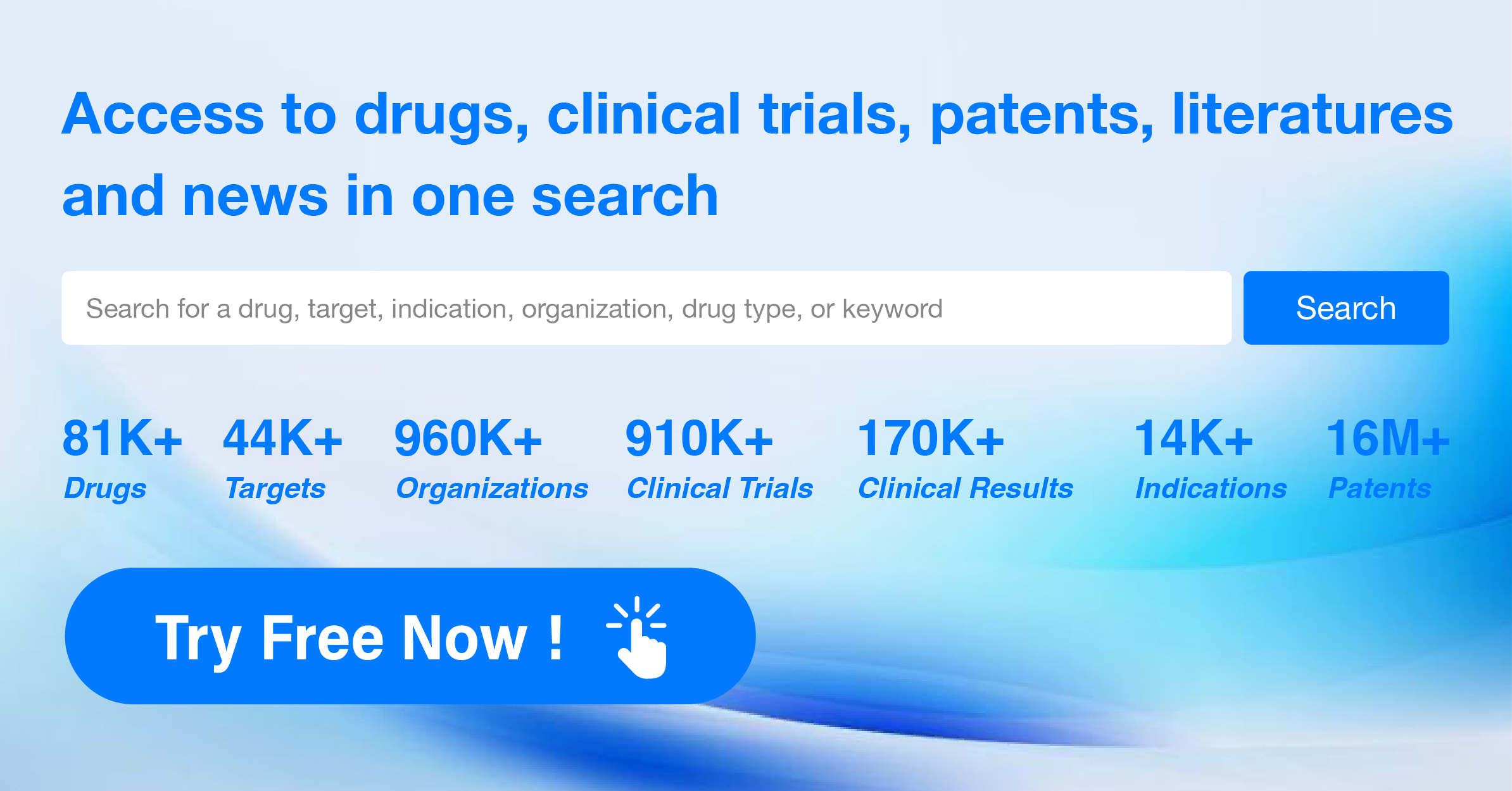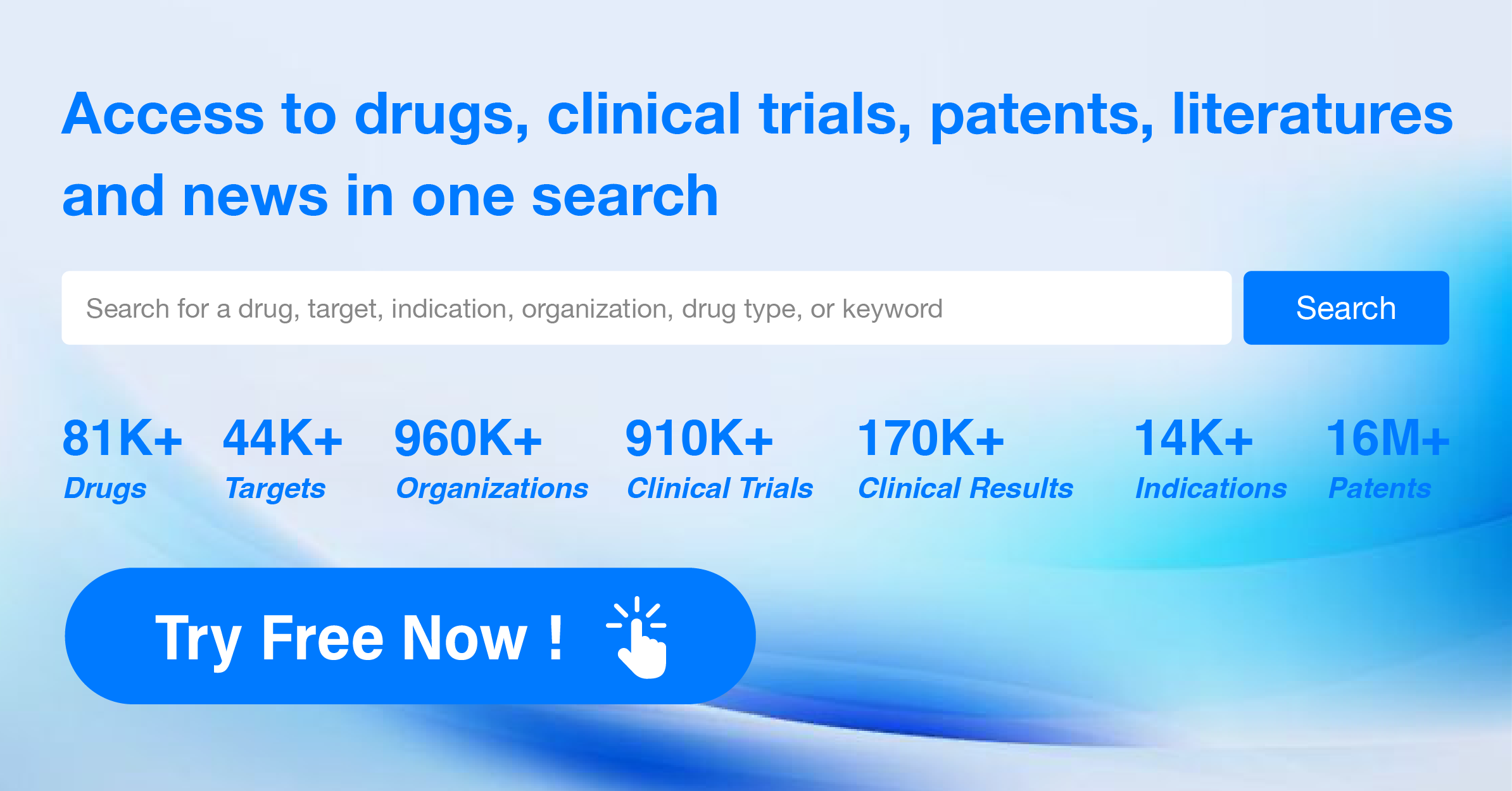Global New Drug Research and Development Progress Weekly Report(3.25-3.31)
Global Pharmaceutical Research and Development Progress
1.AstraZeneca’s long-acting C5 complement inhibitor Ultomiris approved by the FDA for the treatment of neuromyelitis optica spectrum disorder
On March 25th, AstraZeneca announced that the FDA has approved a new indication for Ultomiris (ravulizumab-cwvz) for the treatment of neuromyelitis optica spectrum disorder (NMOSD) in patients who are positive for anti-aquaporin-4 (AQP4) antibodies (Ab+). The press release indicated that this is the first and only long-acting C5 complement inhibitor that can free such patients from relapse. Ultomiris is a long-acting complement C5 inhibitor, initially approved by the FDA in December 2018 for the treatment of paroxysmal nocturnal hemoglobinuria (PNH); in September 2021, Ultomiris was approved by the FDA for new indications to treat atypical hemolytic uremic syndrome (aHUS) in adults and children (one month and older); in April 2022, Ultomiris’ third indication was approved by the FDA for the treatment of generalized myasthenia gravis (gMG) in adults. This new indication approval is primarily based on data from the Phase III CHAMPION-NMOSD study.
2.Esperion’s oral lipid-lowering therapy approved by the FDA for the prevention of heart disease
Recently, Esperion announced that the FDA, based on positive data from the CLEAR Outcomes study, has approved expanded indications for Nexletol (bempedoic acid) and Nexlizet (bempedoic acid/ezetimibe) for use in primary and secondary prevention populations to reduce the risk of cardiovascular disease and further lower low-density lipoprotein cholesterol (LDL-C). Additionally, the extended label supports the use of Nexletol and Nexlizet as monotherapy or in combination with statins. They are also approved as monotherapy or for use in combination with statins for the treatment of primary hyperlipidemia. The press release notes that this is the first non-statin LDL-C lowering medication approved for a primary prevention population. Esperion states that the FDA approval is expected to increase the population that can benefit from Nexletol and Nexlizet by sevenfold.
3.Successful Phase III Study of Reboxetine for the Treatment of Narcolepsy Type III
On March 25th, Axsome announced that the Phase III SYMPHONY study of AXS-12 (reboxetine) for the treatment of narcolepsy reached its primary endpoint, demonstrating that AXS-12 significantly reduced the frequency of cataplexy episodes in patients with narcolepsy. The SYMPHONY study was a randomized, double-blind, multicenter, placebo-controlled clinical trial (n=90) that assessed the efficacy and safety of AXS-12 (5 mg, once daily in week 1, twice daily in weeks 2-5) in patients with narcolepsy. The primary endpoint of the study was the change in the weekly frequency of cataplexy attacks, with a key secondary endpoint being the severity of daytime sleepiness (EDS) assessed objectively by the Clinical Global Impression-Severity (CGI-S) scale and subjectively by the Epworth Sleepiness Scale (ESS). Results showed that, compared to the placebo group, patients treated with AXS-12 experienced a significant reduction in weekly cataplexy attack frequency from baseline (-83% vs. -66%, p=0.018). Moreover, AXS-12 rapidly reduced the frequency of cataplexy attacks as early as week 1 (-56% vs. -31%, p=0.007). Additionally, AXS-12 not only increased the proportion of patients achieving cataplexy remission (defined as a 100% reduction in cataplexy attack frequency) (33% vs. 9.5%, p=0.008) but also increased the number of cataplexy-free days (+84.5% vs. +22.6%, p=0.014). AXS-12 is a highly selective and potent norepinephrine reuptake inhibitor (NRI) and cortical dopamine modulator. AXS-12 had previously been approved for the treatment of depression.
4. 85% Reduction in Seizure Rate! Positive Clinical Data of Antisense Oligonucleotide Therapy STK-001 Announced
Recently, Stoke Therapeutics announced positive data from two Phase 1/2a trials and two open-label extension (OLE) studies of its investigational antisense oligonucleotide (ASO) therapy, STK-001, for the treatment of children and adolescents with Dravet syndrome. The analysis indicated that STK-001 significantly and durably reduced the frequency of epileptic seizures by 85% after three months of administration, and the drug was well-tolerated. Stoke plans to discuss with regulatory authorities about a randomized controlled registration study to further advance the development of STK-001. The announced Phase 1/2a study was a multicenter, open-label trial designed to evaluate the safety, tolerability, pharmacokinetics, and potential efficacy of STK-001 in treating children and adolescents aged 2-18 with Dravet syndrome. Data at the end of the Phase 1/2a study showed that patients who received 70 mg of STK-001 in addition to existing antiepileptic drugs experienced a significant and sustained decrease in the frequency of epileptic seizures. At three months post-final dose, there was an observed 85% median reduction in seizure frequency (n=10), and at six months, a 74% median reduction (n=9). Moreover, OLE study analyses indicated clinically meaningful improvements in various cognitive and behavioral measures at 12 months, including multiple parameters of the Vineland Adaptive Behavior Scales (VINELAND-3), supporting the potential of STK-001 to alter the progression of the disease.
5.Viking's innovative oral weight loss therapy VK2735 shows positive clinical results, with a nearly 10-pound weight reduction in 4 weeks
On March 27th, Viking Therapeutics announced that its oral therapy, VK2735, achieved positive results in a phase I clinical trial for obesity treatment. Participants receiving the highest dose experienced a 5.3% weight loss after 28 days. VK2735 is a dual agonist targeting glucagon-like peptide-1 (GLP-1) and glucose-dependent insulinotropic polypeptide (GIP) receptors, currently under development for treating metabolic disorders including obesity. Based on the results of the phase I trials, the company plans to initiate a phase II clinical trial later this year focusing on the oral VK2735 formulation for obesity treatment. This 28-day dose-escalation study highlighted the positive clinical activity of oral VK2735 treatment. The patient cohorts treated with VK2735 demonstrated dose-dependent weight loss, with reductions of up to 5.3% (4.9 kilograms) compared to baseline. Compared to placebo, the VK2735 cohorts also showed a mean weight reduction, reaching as high as 3.3%. An exploratory assessment of the proportion of subjects achieving at least a 5% weight loss after 28 days showed that 57% of participants treated with the highest dose of VK2735 achieved ≥5% weight loss, compared to 0% in the placebo group. Based on preliminary evaluations of the weight loss trajectory, the company believes that a treatment duration extending beyond 28 days might further reduce weight. Oral VK2735 was well tolerated with a promising safety profile. Among participants treated with VK2735, all treatment-emergent adverse events (TEAEs) were mild or moderate, with the majority (76%) being reported as mild. Based on positive results for weight loss, as well as safety and tolerability, the company has decided to continue further dose escalation in this study. Viking also plans to initiate a phase II trial for oral VK2735 in obese patients in the second half of 2024.
6.Significantly inhibiting brain metastasis tumor growth in lung cancer patients, Novocure's innovative therapy reaches primary endpoint in phase III clinical trial.
On March 28th, Novocure announced its phase III clinical trial METIS had met its primary endpoint, evidencing that Tumor Treating Fields (TTFields) therapy combined with supportive care significantly prolongs the time to intracranial progression compared to supportive care alone in patients with non-small cell lung cancer (NSCLC) who have 1-10 brain metastases. Patients treated with TTFields and supportive care had a median time to intracranial progression of 21.9 months, compared to 11.3 months for those receiving supportive care only (n=298, HR=0.67, P=0.016). Developed by Novocure, Tumor Treating Fields use electric fields tuned to specific frequencies to disrupt the movement of polar molecules required during cell division, thereby impeding cell division and inhibiting tumor growth. TTFields do not stimulate or heat tissue, causing minimal harm to healthy cells, with mild to moderate skin irritation being the most commonly reported side effect. The therapy has been approved by the FDA for the treatment of malignant pleural mesothelioma and glioblastoma. It is also approved in China for the treatment of glioblastoma. This treatment modality is undergoing multiple clinical trials in combination with other therapies for various types of cancer, including liver cancer, stomach cancer, pancreatic cancer, and brain metastases. Zai Lab holds the development rights to this therapy in the Greater China region.
7.Syndax's Potential "First-in-Class" Small Molecule Drug Granted FDA Priority Review Status
Syndax Pharmaceuticals recently announced that the U.S. FDA has accepted its New Drug Application (NDA) for the investigational therapeutic revumenib and granted it Priority Review status for the treatment of patients with relapsed/refractory acute leukemia carrying KMT2A rearrangements (KMT2Ar). Revumenib is a potential "first-in-class" menin inhibitor. The NDA submission was supported by positive data from the pivotal clinical trial AUGMENT-101, which investigated the efficacy of revumenib in adult and pediatric patients with acute myeloid leukemia (AML) and acute lymphoblastic leukemia (ALL) carrying KMT2Ar. As previously reported, the trial met its primary endpoint in an interim analysis, where 23% (13/57; 95% CI: 12.7, 35.8, one-sided p=0.0036) of the 57 evaluable patients achieved complete remission (CR) or complete remission with partial hematologic recovery (CRh). Of those who achieved CR/CRh and were assessed for minimal residual disease (MRD), 70% of the patients were MRD-negative. Additionally, the overall response rate (ORR) in patients reached 63% (36/57). Revumenib is a potent and selective small molecule inhibitor of the menin-KMT2A interaction. Revumenib has been granted Orphan Drug Designation by the FDA and the European Commission for the treatment of AML patients, as well as Fast Track designation by the FDA for the treatment of adult and pediatric patients with relapsed/refractory acute leukemia carrying KMT2A rearrangements or NPM1 mutations. Revumenib also received Breakthrough Therapy Designation from the FDA for the treatment of adult and pediatric patients with relapsed/refractory acute leukemia carrying KMT2A rearrangements.
8.Gilead's Antiviral Therapy Approved by FDA for Extended Indications
On March 28, Gilead Sciences announced that the U.S. FDA has approved a supplemental New Drug Application (sNDA) for Vemlidy (tenofovir alafenamide) tablets for once-daily treatment (25 mg) of children six years and older with chronic hepatitis B virus (HBV) infection weighing at least 25 kilograms and with compensated liver disease. The approval of Vemlidy for this pediatric patient population is primarily supported by data from a 96-week phase 2 clinical trial (Study 1092). The trial compared the treatment efficacy of Vemlidy (25 mg) to placebo in 18 treatment-naïve and treatment-experienced patients aged between 6 and under 12 years weighing at least 25 kilograms. Analysis demonstrated that the viral suppression rate gradually increased in both the Vemlidy group and the placebo group patients switched to Vemlidy after the 24th week throughout the entire 96-week trial period.
9.Lipocine Announces Positive Phase 2 Clinical Trial Results for Potential "First-in-Class" Therapeutic for Cirrhosis
On March 29th, Lipocine Inc. announced top-line results from a Phase 2 clinical study of its potential "first-in-class" therapy, LPCN 1148, for the treatment of patients with cirrhosis. The study demonstrated that the primary endpoint was met. Lipocine plans to meet with the U.S. FDA to discuss the developmental pathway for the drug's market approval. The Phase 2 proof-of-concept study was a randomized, placebo-controlled trial involving male patients with cirrhosis who are listed for liver transplantation and who have sarcopenia as a comorbidity. The primary endpoint was the change in L3-skeletal muscle index (SMI) at week 24, where L3-SMI is a metric used to estimate whole-body skeletal muscle mass, with patients undergoing SMI analyses at baseline, as well as at weeks 12, 24, 36, and 52. Key secondary endpoints included the incidence rate of overt hepatic encephalopathy (OHE) and the safety/tolerability of LPCN 1148. The analysis demonstrated that the trial met its primary endpoint, with an increase in SMI observed in patients at week 24, continuing through week 52. The placebo group patients also experienced an increase in SMI after switching to LPCN 1148. Additionally, fewer significant OHE events occurred during LPCN 1148 treatment, with a longer time until the first recurrence of OHE events. From a safety perspective, LPCN 1148 was well-tolerated, with adverse events and severity comparable to placebo, and fewer hospitalization days were recorded for subjects in the LPCN 1148 group. LPCN 1148 is an oral investigational therapy containing testosterone dodecanoate, which is a unique androgen receptor agonist. It is being developed to treat cirrhosis and associated comorbidities, including sarcopenia and OHE, and is a potential "first-in-class" therapy.
10.Bristol Myers Squibb's Leading KRAS Inhibitor Meets Primary Endpoint in Phase 3 Trial
On March 29th, Bristol Myers Squibb announced that its KRAS G12C inhibitor, Krazati (adagrasib), achieved the primary endpoint of progression-free survival (PFS) and the key secondary endpoint of overall response rate (ORR) in the pivotal Phase 3 trial KRYSTAL-12 for patients with non-small cell lung cancer (NSCLC) harboring the KRAS G12C mutation. KRYSTAL-12 is an open-label, multicenter, randomized Phase 3 study designed to assess the efficacy and safety of Krazati in comparison to standard care chemotherapy alone in patients with NSCLC with the KRAS G12C mutation. The primary endpoint was PFS as assessed by a blinded independent central review (BICR), with secondary endpoints including overall survival (OS), ORR, duration of response (DOR), and safety. The results of this confirmatory trial indicated that Krazati, when used as second-line or later treatment for these patients, showed statistically significant and clinically meaningful benefits in PFS and ORR when compared to standard care chemotherapy. No new safety signals were observed for Krazati, and the safety data were consistent with the known safety profile. Krazati is a highly specific and potent oral KRAS G12C inhibitor with an optimized design for sustained target inhibition. It has a half-life of up to 24 hours and extensive tissue distribution and is capable of crossing the blood-brain barrier to maximize drug efficacy. In June 2021, Krazati was granted Breakthrough Therapy designation by the U.S. FDA and received accelerated approval in December 2022 for the treatment of NSCLC patients harboring the KRAS G12C mutation and who have been previously treated. Originally developed by Mirati Therapeutics, Bristol Myers Squibb acquired the therapy in October last year for $4.8 billion, capturing this therapeutic. Zai Lab holds the exclusive rights for the research, development, production, and commercialization of Krazati in Greater China.
For more information on the progress of drug development, please follow the Synapse database.
Dynamics of Global Pharmaceutical Trade Cooperation
1.Novo Nordisk acquires RNA therapeutics innovator Cardior to strengthen cardiovascular portfolio
On March 25th, Novo Nordisk and Cardior Pharmaceuticals announced that Novo Nordisk has agreed to acquire the latter for approximately $1.1 billion, including an upfront payment and additional payments upon achieving certain developmental and commercial milestones. Cardior is a clinical-stage biopharmaceutical company focused on the discovery and development of RNA-based therapeutics designed to prevent, repair, and reverse cardiac diseases. Their key technology platform involves novel RNA therapies targeting non-coding RNAs (ncRNAs). Dysregulation of ncRNAs can lead to deleterious cellular remodeling that impairs overall cardiac function and causes heart failure, playing a significant regulatory role within cells. Cardior’s lead project, CDR132L, is an oligonucleotide-based ncRNA inhibitor that targets micro-RNA-132, currently in phase II clinical trials for the treatment of heart failure. Preliminary phase Ib clinical data published in the European Heart Journal demonstrated that CDR132L is safe and well-tolerated. Additionally, heart function in heart failure patients treated with CDR132L showed improvement compared to those receiving a placebo.
2.Biocytogen Pharmaceuticals Announces Collaboration with ABL Bio to Jointly Develop Novel Bispecific Antibody-Drug Conjugates (BsADCs)
On March 25th, Biocytogen announced a collaboration with ABL Bio Inc., a South Korean biotech company in the clinical stage of developing novel therapies for cancer and central nervous system diseases, to co-develop novel bispecific antibody-drug conjugates (BsADCs). Biocytogen's RenLite® mouse platform is capable of generating fully human antibodies that recognize different epitopes with high affinity. Characterized by producing common light-chain antibodies, the platform offers design flexibility, simplified production process, and good drug-like properties for the development of BsADCs. Based on this platform, the collaboration could potentially expand to various forms of ADC drug development in the future.
3.AI Platform Discovers Novel Target: Potential "Best-in-Class" ALS Therapy Receives Over 100 Million Euros in Support
On March 26th, Verge Genomics and Ferrer announced a strategic collaboration to develop Verge's lead candidate drug, VRG50635, for the treatment of sporadic and familial amyotrophic lateral sclerosis (ALS) in Europe, Central and South America, Southeast Asia, and Japan. VRG50635 is a potential "best-in-class" small molecule inhibitor targeting PIKfyve. The press release stated that VRG50635 is one of the first drugs to enter clinical trials that were completely discovered and developed by an artificial intelligence (AI) platform. The collaboration combines Verge's "all-in-human" technology platform for target discovery and drug development, along with its innovation in clinical trials, with Ferrer's expertise in clinical development, manufacturing, and commercialization. According to the terms of the agreement, Ferrer will have exclusive rights to co-develop and commercialize VRG50635 for the treatment of ALS in various regions outside the United States. Verge retains all rights to develop and commercialize VRG50635 in the United States and all other countries and regions not covered by the agreement. Under the agreement, Verge could receive up to 112.5 million euros in upfront and potential milestone payments.
4.AnHeart Therapeutics Acquired by Nuvation Bio
On March 26th, Nuvation Bio and AnHeart Therapeutics announced that the two companies have reached a definitive agreement for Nuvation Bio to acquire AnHeart Therapeutics through an all-stock transaction. Nuvation Bio is a biopharmaceutical company aimed at meeting the urgent needs in cancer treatment by developing differentiated and novel therapeutic candidates. AnHeart Therapeutics is a global clinical-stage biopharmaceutical company dedicated to developing new precision therapies for cancer patients. According to a press release from AnHeart Therapeutics, following the completion of the acquisition, the former shareholders of AnHeart Therapeutics will own approximately 33% of the fully diluted shares of Nuvation Bio, while the existing shareholders of Nuvation Bio will hold about 67% of its shares. The acquisition is expected to close in the second quarter of 2024. As stated in the press release, this acquisition will position Nuvation Bio as a global oncology pharmaceutical company with multiple late-stage clinical development projects.
5.Moderna Reaches Influenza Project Funding Agreement with Blackstone Life Sciences
On March 27th, during its Vaccine Day event, Moderna disclosed that it had recently reached a funding agreement with Blackstone Life Sciences to develop and commercialize its influenza vaccine projects. Under the terms of the agreement, the Blackstone Group will provide Moderna with up to $750 million in research and development funding. In return, Moderna will pay Blackstone cumulative commercial milestones and low single-digit royalties in the future. Moderna states that this capital will be accounted for as a reduction in research and development expenses, but it will not result in any changes to the company's anticipated $4.5 billion research and development expenditure framework for 2024. Moderna retains full rights to its influenza projects. Currently, Moderna is developing several influenza and combination flu vaccines.
6.Avalo Therapeutics Announces Acquisition of AlmataBio
On March 27th, Avalo Therapeutics announced the acquisition of AlmataBio and the acquisition of AVTX-009, a monoclonal antibody targeting interleukin-1 beta (IL-1β) that has entered the phase II clinical trial stage. Additionally, Avalo completed a private financing round of $185 million, which included an initial upfront investment of $115.6 million. The financing was led by Commodore Capital and TCGX, with participation from BVF Partners, Deep Track Capital, OrbiMed, Petrichor, and RA Capital Management. AVTX-009 is a humanized monoclonal antibody (IgG4) that binds with high affinity to IL-1β and inhibits its activity. IL-1β is a key mediator of inflammatory responses, with its overproduction or dysregulation closely linked to a variety of autoimmune and inflammatory diseases, making it an important and validated therapeutic target. Previous research has shown that by inhibiting IL-1β, effective treatment of Hidradenitis Suppurativa (HS) and other inflammatory diseases in dermatology, gastroenterology, and rheumatology can be achieved. Avalo plans to continue advancing the development of AVTX-009 as a treatment for Hidradenitis Suppurativa. The primary results of the phase II clinical trial for AVTX-009 targeting HS are expected to be released in 2026.
7.Gilead Acquires Innovative Cancer Immunotherapy for Over $600 Million!
On March 29th, Gilead Sciences and Xilio Therapeutics announced an exclusive licensing agreement potentially worth more than $600 million. The two companies will jointly develop and commercialize Xilio's tumor-activated interleukin-12 (IL-12) protein XTX301, currently in phase I clinical trials. Xilio Therapeutics is a clinical-stage biotechnology company focused on the discovery and development of tumor-activated immunotherapies. The company is utilizing its proprietary tumor-activated platform to build a pipeline of novel tumor-activated molecules, including antibodies, cytokines, bispecific drugs, and cell conjugates, aiming to enhance therapeutic index and localize anti-tumor activity to the tumor microenvironment. XTX301 is currently being evaluated in a phase I dose-escalation trial in patients with advanced solid tumors. Under the terms of the agreement, Xilio has granted Gilead the global exclusive rights to develop and commercialize XTX301. Xilio will receive an upfront payment of $43.5 million and is eligible for additional potential development, regulatory, and commercial milestone payments totaling up to $604 million. Xilio will be responsible for the development of the ongoing phase I trial of XTX301. After Xilio delivers the designated clinical data for XTX301, Gilead will have the option to take over the development and commercialization rights and pay a fee of $75 million. Prior to that, Xilio is eligible for a total of up to $29 million in additional investment and development milestone payments.





